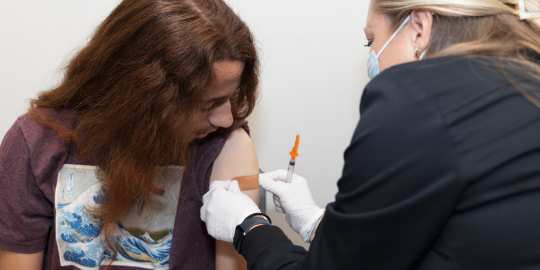School Health in Lorain County
Lorain County Public Health (LCPH) works to make sure students have a healthy and safe environment to learn and play. We use a collaborative approach to school health as we:
- Help school districts make it easier for students to learn and play
- Conduct environment inspections at all local school building
- Share health promotion and disease prevention resources
- Contract with school districts to provide school nursing services
We help school districts make it easier for students to learn and play
With experts available to provide resources and technical assistance to your district or school wellness team, LCPH can help you kick-start the wellness process. Call 440-322-6367 and ask for the Population Health division or email ph@loraincountyhealth.com to learn about the Whole School, Whole Community, Whole Child (WSCC) model we use.
Check out these resources and make changes to your classroom:
School Environment Inspections
LCPH Environmental Health Specialists conduct school environment inspections twice per year in every local school building to ensure school environments are safe places where students can learn and play. Food safety inspections and education are another layer of our partnership with schools.
Health promotion and disease prevention resources
Healthy eating is an important component of school health, as many children will eat two meals at school each day. School nutrition professionals are on the front lines of helping Lorain County’s children develop healthy eating habits, such as eating fruits and vegetables. Increased fruit and vegetable intake may assist in healthy weight management when high-calorie foods are replaced by fruits and vegetables.
LCPH provides technical assistance to school food service programs to make policy, systems, and environmental changes that improve the nutrition options of our students. Ways LCPH can help:
- Review current menus and suggest changes and substitutions
- Design and install salad bars in lunchrooms that can increase lunch participation and decrease food waste and labor costs, all while meeting USDA school meal patterns
- Implement Smarter Lunchrooms using no-cost and low-cost strategies
Physical activity can increase students’ performance while increasing focus. Children who get 30 minutes of physical activity every day build healthy habits that last a lifetime and prevent obesity and disease. Ways LCPH can help:
- Yoga 4 Classroom training and implementation
- Go Noodle and Physical Activity in the classroom
- Walk and Bike to School
Social and emotional health is an important component of school health. Students should feel supported and comfortable at school. Children who have both peers and mentors that they trust are more resilient and can be more successful throughout their lifetime. Ways LCPH can help:
- Training
- Professional Development for Staff
Contract with school districts to provide school nursing services
During the school year, multiple school districts and independent schools contracted with LCPH to provide nursing services to their students and school staff. Some of the services provided by school nurses include:
- Vision and hearing screenings: Vision and hearing are key components in a child's learning process. LCPH school nurses conduct vision and hearing screenings to identify vision and hearing deficits. Children with noted deficits are referred for further evaluation and resources are made available to parents as needed.
- Dental: Dental health is important, and protecting your child’s teeth is a first step to keeping their teeth and mouth healthy for a lifetime. In fact, children who have tooth decay miss an average of 12 days of school every year, and have lower grades than children with good dental health. The school nurse can assist the school and parents with resources regarding dental care and in-school dental programs.
- Other dental care services near you:
- Lorain County Health & Dentistry - call 440-240-1655 to make an appointment
- Lorain County Community College - call 440-366-4948 to make an appointment for preventative services only
- Oral Health programs in Ohio
- Other dental care services near you:
- Vaccine records and management: Vaccinations protect students, their family and the community from vaccine preventable diseases. LCPH school nurses review vaccine records to make sure students are up to date on recommended vaccines and refer students for missing vaccines if needed. LCPH can provide missing vaccines to students.
- Chronic disease management: LCPH school nurses work with parents, physicians and school staff to ensure student's chronic medical needs are managed accurately, safely and with little disruption to the student’s school day. Diabetes, food allergies, asthma and seizures are becoming common chronic illness within the school environment. These illnesses are managed by school nurses through medical, nursing and emergency planning.
Whole School, Whole Community, Whole Child (WSCC) model.


